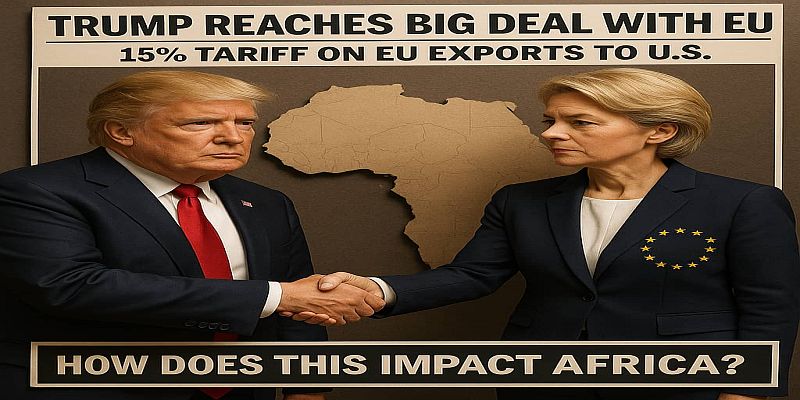The Shockwaves of a Tariff Pact: U.S.–EU Trade Realignment and Its Echoes Across Africa

In the ever-spinning chessboard of global trade, a single handshake between two economic titans can send tremors through continents untouched by the ink of their agreement. Such is the case with the newly minted U.S.–EU trade accord of July 27, 2025, a deal that might appear, on the surface, to be a bilateral correction of economic tensions—but whose reverberations will, without doubt, reach the soil and stomachs of the African people.
The deal imposes a 15% tariff on most EU goods entering the United States, is a strategic compromise by both powers to avert a full-blown trade war. While the U.S. secures $750 billion in energy purchases and heavy investments from Europe, the EU evades more punitive tariff threats. Yet in this realignment of power and commerce, Africa is neither a signatory nor a beneficiary—but once again, a bystander caught in the backdraft.
I. Africa and the Ghost of Exclusion
Africa’s absence at the negotiation table is no surprise—its invisibility is not new. But what is new is the scale of impact these seemingly distant agreements now have on the continent’s fragile economies. Africa remains an import-dependent region, and the European Union remains its largest trading partner, especially in sectors like machinery, pharmaceuticals, vehicles, and consumer goods.
With the EU now facing steeper costs to access the U.S. market, its exporters will naturally seek refuge in more receptive and untapped markets—and Africa, with its rising middle class and weak regulatory resistance, becomes an easy alternative. The result? A surge of EU goods flooding African markets, undercutting local producers and stalling the growth of domestic manufacturing under the AfCFTA (African Continental Free Trade Area) framework.
This is not just a trade imbalance—it is a developmental betrayal.
II. The Twilight of AGOA and the Rise of Tariff Retaliation
While Europe negotiates bilateral mercy, Africa faces increasing hostility from its old partner across the Atlantic. Under Trump’s new doctrine of “reciprocal fairness,” African exports to the U.S. have been hit with retaliatory tariffs: 31% on South African wines, 14% on Nigerian textiles, and over 50% on Lesotho’s garments. The very sectors AGOA (African Growth and Opportunity Act) once nurtured are now being starved by the same hand that once fed them.
Lesotho’s garment factories—built entirely on AGOA’s promise—are now closing. Nigerian exporters have lost over $527 million in trade value to the U.S. this year alone. It is a textbook case of how preferential trade can mutate into economic asphyxiation once political winds shift. Meanwhile, African leaders appear to have no coordinated continental voice, leaving individual nations scrambling for bilateral favors instead of forging a united trade response through the African Union.
III. The Strategic Opportunity in the Crisis
Yet within every tremor lies a chance to rebuild with stronger foundations. The U.S.–EU deal exposes a vital truth: Africa must delink its destiny from dependency.
If EU exporters are now disadvantaged in U.S. markets, then Africa must become the next best alternative—not as a dumping ground, but as a trade partner with standards and leverage. The path forward lies in:
Strengthening AfCFTA enforcement, to ensure intra-African trade is not overwhelmed by EU surplus exports.
Investing in SPS (Sanitary and Phytosanitary) infrastructure and quality standards, so African products can penetrate EU and Asian markets competitively.
Renegotiating a new multilateral trade engagement with the U.S., not based on pity or preference, but on value and partnership—especially around critical minerals, climate-tech inputs, and digital trade.
Africa’s abundance in cobalt, rare earth minerals, solar potential, and agricultural capacity must be used as leverage, not lament. This begins with continental coordination, not fragmented lobbying.
IV. The Philosophical and Moral Reckoning
There is a deeper irony here, one that speaks not just to economics but to dignity. The United States and Europe, both preaching democratic order and human rights, have once again entered into a pact that leaves the Global South watching from the sidelines as their destinies are decided.
In his book The Wretched of the Earth, Frantz Fanon warned: “Imperialism leaves behind germs of rot which we must clinically detect and remove from our land and from our minds.” What are these germs today? They are the psychological dependence on Western aid, the structural inequality in global trade, and the failure to dream of a self-reliant Africa. Until Africa sees itself as a negotiator—not a recipient—it will always remain reactive. The true tragedy is not the tariff. It is our silence in the face of it.
V. Conclusion: Africa’s Crossroads, Again
The 15% U.S. tariff on EU exports is not a story about Brussels or Washington alone. It is a story about how the global system still sidelines the world’s youngest and most abundant continent. It is a wake-up call. Africa must build value from within, assert sovereignty in trade, and forge economic alliances that reflect its aspirations—not its former subjugations.
The era of waiting for preferential crumbs must end. Africa must rise not in protest, but in proposal. Not with begging bowls, but with bargaining power.
Let this be the final backdraft we suffer quietly. Let this be our beginning.
By Isaac Christopher Lubogo
Legal Scholar | Philosopher | Author | Advocate for Africa’s Digital Sovereignty
# SuiGeneris
Sources:
Associated Press (2025). US–EU Tariff Deal Reached. https://apnews.com
Financial Times (2025). African Garment Sector Hit by U.S. Tariffs. https://ft.com
CSIS (2025). How Africa Should Respond to Trump’s Tariffs. https://csis.org
Investopedia (2025). Trump Signs $750bn EU Deal. https://investopedia.com
SpringerLink (2024). SPS Infrastructure and EU–Africa Trade. https://link.springer.com
Wikipedia. African Continental Free Trade Area. https://en.wikipedia.org/wiki/AfCFTA
